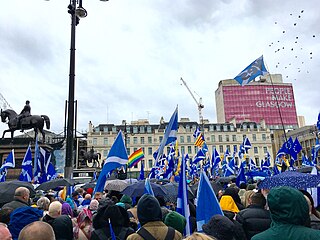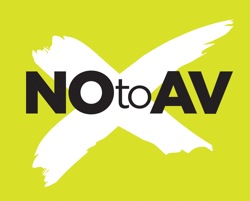Related Research Articles

The politics of the United Kingdom functions within a constitutional monarchy where executive power is delegated by legislation and social conventions to a unitary parliamentary democracy. From this a hereditary monarch, currently Charles III, serves as head of state while the Prime Minister of the United Kingdom, currently Rishi Sunak, serves as the elected head of government.

The Democratic Unionist Party (DUP) is a unionist, loyalist, and national conservative political party in Northern Ireland. It was founded in 1971 during the Troubles by Ian Paisley, who led the party for the next 37 years. Currently led by Jeffrey Donaldson, it is the second largest party in the Northern Ireland Assembly, and is the fifth-largest party in the House of Commons of the United Kingdom. The party has been described as centre-right to right-wing and socially conservative, being anti-abortion and opposing same-sex marriage. The DUP sees itself as defending Britishness and Ulster Protestant culture against Irish nationalism and republicanism. It is also Eurosceptic and supported Brexit.

Scottish independence is the idea of Scotland as a sovereign state, independent from the United Kingdom, and refers to the political movement that is campaigning to bring it about.

The Scottish Conservative & Unionist Party is part of the UK Conservative Party active in Scotland, it is a centre right party. The party holds 31 of the 129 seats in the Scottish Parliament and 7 out of the 59 Scottish seats in the House of Commons in Westminster It has 209 local councillors of 1,227.

In the United Kingdom, unionism is a political stance favouring the continued unity of England, Scotland, Wales and Northern Ireland as one sovereign state, the United Kingdom of Great Britain and Northern Ireland. Those who support the union are referred to as Unionists. Though not all unionists are nationalists, UK or British unionism is associated with British nationalism, which asserts that the British are a nation and promotes the cultural unity of the Britons, which may include people of English, Scottish, Welsh, Irish, Cornish, Jersey, Manx and Guernsey descent.

NOtoAV was a political campaign in the United Kingdom whose purpose was to persuade the public to vote against the Alternative Vote (AV) in the referendum on 5 May 2011. The opposition to switching to AV was successful, with the "No" vote to switching to AV receiving 67.9% of votes cast in the 2011 referendum.

On 23 June 2016, a referendum, commonly referred to as the EU referendum or the Brexit referendum, took place in the United Kingdom (UK) and Gibraltar to ask the electorate whether the country should remain a member of, or leave, the European Union (EU). It was organised and facilitated through the European Union Referendum Act 2015 and the Political Parties, Elections and Referendums Act 2000. The referendum resulted in 51.9% of the votes cast being in favour of leaving the EU. The referendum was legally non-binding due to the ancient principle of parliamentary sovereignty as the enabling legislation only specified that a referendum should be held; however, the Conservative government of the time which was led by the then Prime Minister David Cameron promised to implement the result, beginning the process of the country's withdrawal from the EU commonly termed "Brexit".
Arron Fraser Andrew Banks is a British businessman and political donor. He is the co-founder of the Leave.EU campaign. Banks was previously one of the largest donors to the UK Independence Party (UKIP) and helped Nigel Farage's campaign for Britain to leave the EU.

The 2017 United Kingdom general election was held on Thursday 8 June 2017, two years after the previous general election in 2015; it was the first since 1992 to be held on a day that did not coincide with any local elections. The governing Conservative Party remained the largest single party in the House of Commons but lost its small overall majority, resulting in the formation of a Conservative minority government with a confidence and supply agreement with the Democratic Unionist Party (DUP) of Northern Ireland.

The 2017 Northern Ireland Assembly election was held on Thursday, 2 March 2017. The election was held to elect members (MLAs) following the resignation of deputy First Minister Martin McGuinness in protest over the Renewable Heat Incentive scandal. McGuinness' position was not filled, and thus by law his resignation triggered an election.

The 2019 United Kingdom general election was held on Thursday 12 December 2019 to elect members of the House of Commons. The Conservative Party won a landslide victory with a majority of 80 seats, a net gain of 48, on 43.6% of the popular vote, the highest percentage for any party since the 1979 United Kingdom general election.

Vote Leave was a campaigning organisation that supported a "Leave" vote in the 2016 United Kingdom European Union membership referendum. On 13 April 2016 it was designated by the Electoral Commission as the official campaign in favour of leaving the European Union in the Referendum.

Labour Leave is a Eurosceptic campaign group in the United Kingdom. The group is unofficially affiliated with the Labour Party, and campaigned for the United Kingdom to vote to withdraw from the European Union, in the June 2016 EU Referendum. The group was led by eurosceptic Labour MPs: Graham Stringer, Kelvin Hopkins, and Roger Godsiff.
A number of politicians, public figures, newspapers and magazines, businesses and other organisations endorsed either the United Kingdom remaining in the EU or the United Kingdom leaving the EU during the 2016 United Kingdom European Union membership referendum.

Campaigning in the United Kingdom European Union membership referendum began unofficially on 20 February 2016 when Prime Minister David Cameron formally announced under the terms of the European Union Referendum Act 2015 that a referendum would be held on the issue of the United Kingdom's membership of the European Union. The official campaign period for the 2016 referendum ran from 15 April 2016 until the day of the poll on 23 June 2016.

Richard Leonard is a British politician who served as Leader of the Scottish Labour Party from 2017 to 2021. He has been a Member of the Scottish Parliament (MSP), as one of the additional members for the Central Scotland region, since 2016. He ideologically identifies as a socialist, democrat and internationalist.
After the British EU membership referendum held on 23 June 2016, in which a majority voted to leave the European Union, the United Kingdom experienced political and economic upsets, with spillover effects across the rest of the European Union and the wider world. Prime Minister David Cameron, who had campaigned for Remain, announced his resignation on 24 June, triggering a Conservative leadership election, won by Home Secretary Theresa May. Following Leader of the Opposition Jeremy Corbyn's loss of a motion of no confidence among the Parliamentary Labour Party, he also faced a leadership challenge, which he won. Nigel Farage stepped down from leadership of the pro-Leave party UKIP in July. After the elected party leader resigned, Farage then became the party's interim leader on 5 October until Paul Nuttall was elected leader on 28 November.

The Conservative–DUP agreement between the Conservative Party and the Democratic Unionist Party (DUP) followed the 2017 United Kingdom general election which resulted in a hung parliament. Negotiations between the two parties began on 9 June, the day after the election, and the final agreement was signed and published on 26 June 2017.

The European Research Group (ERG) is a research support group and caucus of Eurosceptic Conservative Members of Parliament of the United Kingdom. The journalist Sebastian Payne described it in the Financial Times as "the most influential [research group] in recent political history".
Several allegations of unlawful campaigning in the 2016 EU referendum have been made. Some allegations were dismissed by the investigating bodies, but in other cases wrongdoing was established, leading to the imposition of penalties. Sanctions have included the levying of the maximum fine possible on Facebook for breaches of data privacy.
References
- ↑ Ramsay, Adam; Geoghegan, Peter (16 October 2017). "Mystery deepens over secret source of Brexit 'dark money'". openDemocracyUK. London: openDemocracy. Retrieved 24 October 2017.
- ↑ Learmonth, Andrew; Geoghegan, Peter (17 May 2020). "Tory dark money donor Richard Cook's Union campaign funding boast". The National. Retrieved 24 July 2020.
- ↑ Doward, Jamie (1 July 2017). "Brexit minister linked to group that used loophole to channel £435,000 to DUP". The Observer. Guardian News and Media. Retrieved 25 October 2017.
- ↑ Hutcheon, Paul (21 May 2017). "Richard Cook: chair of the shadowy Constitutional Research Council talks to the Sunday Herald". Sunday Herald. Glasgow. Retrieved 25 October 2017.
- ↑ O’Toole, Fintan (16 May 2017). "What connects Brexit, the DUP, dark money and a Saudi prince?". The Irish Times. Dublin. Retrieved 25 October 2017.
- ↑ Johnson, Simon (5 March 2017). "Business leaders 'ready to donate six-figure sums to save UK' in second Scottish referendum". The Telegraph. Retrieved 25 October 2017.